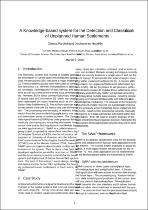 ResearchSpace
ResearchSpace
Knowledge-based system for the detection and classification of unplanned human settlements
JavaScript is disabled for your browser. Some features of this site may not work without it.
- ResearchSpace
- →
- Research Publications/Outputs
- →
- Conference Publications
- →
- View Item
| dc.contributor.author |
Parbhoo, C

|
|
| dc.contributor.author |
Moodley, D

|
|
| dc.date.accessioned | 2007-06-28T13:40:30Z | |
| dc.date.available | 2007-06-28T13:40:30Z | |
| dc.date.issued | 2007-03 | |
| dc.identifier.citation | Parbhoo, C and Moodley, D. 2007. Knowledge-based system for the detection and classification of unplanned human settlements. 4th IFIP Summer School Workshop Gordon's Bay, South Africa, 26-30 March 2007, pp 1-4 | en |
| dc.identifier.uri | http://hdl.handle.net/10204/708 | |
| dc.description.abstract | The discovery, access and sharing of suitable geospatial information in current open and distributed Spatial Data Infrastructures (SDI) still pose a major challenge. These problems usually stem from a lack of consistent semantics that is different interpretations of geospatial concepts, heterogeneity of data formats and systems as well as a reluctance to share data, amongst others. However, SDI is about communication and sharing of spatial data and information, which has largely been addressed by recent initiatives such as the OGC Sensor Web Enablement. The ability to discover and access sensor data over the Web is only part of the problem. The processing and extracting of relevant information from this data and building applications that use this information poses a further problem. The Sensor Web Agent Platform (SWAP) has been proposed for dynamically discovering and extracting information from sensor data and for building dynamic and flexible Sensor Web applications. SWAP is a collaborative ongoing project, proposed by researchers from the school of Computer Science at UKZN, the Geoinformatics department at University of Muenster and the Information Communications Technology for Earth Observation (ICT4EO) unit at the Meraka Institute, CSIR, Pretoria. SWAP uses ontologies to describe data, entities and interactions in the system. Thus far there is has been one developed application, on wildfire detection, on SWAP, and this by no means proves its suitability for the development and deployment of diverse Sensor Web applications. The aims of this research are to design, develop and deploy another Sensor Web application, for detecting unplanned human settlements in South Africa, on SWAP. | en |
| dc.language.iso | en | en |
| dc.subject | SWAP | en |
| dc.subject | Sensor web agent platform | en |
| dc.subject | ICT4EO | en |
| dc.subject | Information communications technology for earth observation | en |
| dc.subject | Spatial data infrastructures | en |
| dc.title | Knowledge-based system for the detection and classification of unplanned human settlements | en |
| dc.type | Conference Presentation | en |
| dc.identifier.apacitation | Parbhoo, C., & Moodley, D. (2007). Knowledge-based system for the detection and classification of unplanned human settlements. http://hdl.handle.net/10204/708 | en_ZA |
| dc.identifier.chicagocitation | Parbhoo, C, and D Moodley. "Knowledge-based system for the detection and classification of unplanned human settlements." (2007): http://hdl.handle.net/10204/708 | en_ZA |
| dc.identifier.vancouvercitation | Parbhoo C, Moodley D, Knowledge-based system for the detection and classification of unplanned human settlements; 2007. http://hdl.handle.net/10204/708 . | en_ZA |
| dc.identifier.ris | TY - Conference Presentation AU - Parbhoo, C AU - Moodley, D AB - The discovery, access and sharing of suitable geospatial information in current open and distributed Spatial Data Infrastructures (SDI) still pose a major challenge. These problems usually stem from a lack of consistent semantics that is different interpretations of geospatial concepts, heterogeneity of data formats and systems as well as a reluctance to share data, amongst others. However, SDI is about communication and sharing of spatial data and information, which has largely been addressed by recent initiatives such as the OGC Sensor Web Enablement. The ability to discover and access sensor data over the Web is only part of the problem. The processing and extracting of relevant information from this data and building applications that use this information poses a further problem. The Sensor Web Agent Platform (SWAP) has been proposed for dynamically discovering and extracting information from sensor data and for building dynamic and flexible Sensor Web applications. SWAP is a collaborative ongoing project, proposed by researchers from the school of Computer Science at UKZN, the Geoinformatics department at University of Muenster and the Information Communications Technology for Earth Observation (ICT4EO) unit at the Meraka Institute, CSIR, Pretoria. SWAP uses ontologies to describe data, entities and interactions in the system. Thus far there is has been one developed application, on wildfire detection, on SWAP, and this by no means proves its suitability for the development and deployment of diverse Sensor Web applications. The aims of this research are to design, develop and deploy another Sensor Web application, for detecting unplanned human settlements in South Africa, on SWAP. DA - 2007-03 DB - ResearchSpace DP - CSIR KW - SWAP KW - Sensor web agent platform KW - ICT4EO KW - Information communications technology for earth observation KW - Spatial data infrastructures LK - https://researchspace.csir.co.za PY - 2007 T1 - Knowledge-based system for the detection and classification of unplanned human settlements TI - Knowledge-based system for the detection and classification of unplanned human settlements UR - http://hdl.handle.net/10204/708 ER - | en_ZA |





